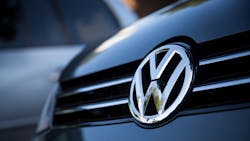Volkswagen Keeps Sales Crown as Toyota Fails to Catch Up
Volkswagen AG retained the car industry’s top spot in sales as Japanese arch-rival Toyota Motor Corp.’s global deliveries failed to match those of its German competitor.
Toyota’s sales rose 2% to 10.6 million vehicles last year, boosted by demand outside its domestic market, the Japanese giant said on Jan. 30 Volkswagen reported deliveries of 10.8 million vehicles earlier this month.
Volkswagen took the sales crown from Toyota in 2016 and has kept it since, weathering a global industry slowdown better than rivals, helped by its top position in the world’s biggest market, China. Still, the Chinese market is quickly turning into a challenge, shrinking for the first time in almost three decades last year and projected to continue to sputter in 2019.
While global scale is critical for manufacturers in order to share costs for new vehicles more broadly, the looming shift toward electric and self-driving cars has highlighted the need for efficiency across sprawling operations to free up funds for new technology.
Global Headwinds
VW and Germany’s BMW AG have warned of challenges this year, including trade spats that threaten to exacerbate an already cooling global economy. Stricter emission rules worldwide are set to force manufacturers to sell more battery-powered cars that are less profitable than combustion vehicles. The squeeze is already becoming evident. Ford Motor Co. and Jaguar Land Rover this month announced thousands of job cuts in Europe.
“Global car manufacturers are taking measures to limit the impact of a deteriorating environment in several markets, and potential pressure on earnings and cash generation coming from declining new vehicle sales,” Fitch Ratings said in a report. That said, many companies entering this phase of the cycle are “better positioned than the last downturn,” according to the ratings agency.
VW is betting on fresh models like the small T-Cross crossover, the Seat Tarraco and the updated Audi Q3 to help sustain demand despite growing headwinds. The Audi premium-car brand, its largest profit contributor, will start rolling out its first all-electric model E-Tron later this year. The market for battery-powered luxury sedans has so far been effectively dominated by Tesla Inc.
Toyota is rolling out an all-new version of the world’s top-selling vehicle, the Corolla, to accelerate its push in China and keep up the pressure on Volkswagen in other markets. The company has also refreshed its Prius hybrid car as it continues its pursuit of electrified vehicles.
Toyota’s sales numbers include its affiliated brands Daihatsu and Hino. Domestic rival Nissan Motor Co. reported global sales of 5.65 million vehicles for 2018.
VW’s global deliveries increased by 0.9 percent across the group’s stable of automotive brands that also includes Porsche and Skoda, as well as Scania and MAN trucks and buses. The tally doesn’t include VW’s Ducati motorbikes.
By Christoph Rauwald
About the Author
Bloomberg
Licensed content from Bloomberg, copyright 2016.
